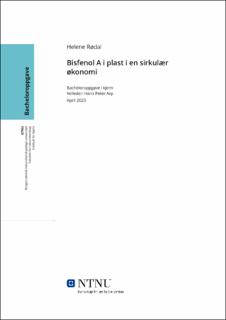| dc.contributor.advisor | Arp, Hans Peter | |
| dc.contributor.author | Rødal, Helene | |
| dc.date.accessioned | 2023-06-27T17:21:28Z | |
| dc.date.available | 2023-06-27T17:21:28Z | |
| dc.date.issued | 2023 | |
| dc.identifier | no.ntnu:inspera:146699659:34437933 | |
| dc.identifier.uri | https://hdl.handle.net/11250/3073816 | |
| dc.description.abstract | Med utgangspunkt i dagens utfordringer rundt produksjon og avfallshåndtering av plast, har det i denne oppgaven blitt undersøkt hvordan tilsetningsstoffet bisfenol A kan inngå i en sirkulær økonomi. Bisfenol A er et av de mange tilsetningsstoffene i plast som har vist seg å kunne ha skadelig effekt allerede ved lave konsentrasjoner. I en sirkulær økonomi er det en fare for at eksponeringen for bisfenol A kan øke gjennom kontinuerlige utslipp fra og med produksjonstrinnet av plast til forbruk, avfallshåndtering og gjenvinning av avfallet. Forskning viser at bisfenol A har en tendens til å akkumulere i resirkulerte plastprodukter. Med utgangspunkt i avfallshierarkiet kan et alternativ for håndtering av bisfenol A i den sirkulære økonomi være å forsøke å erstatte det med andre stoffer som ikke har skadelige effekter på miljøet. Under en slik overgangsperiode vil det være hensiktsmessig å forbrenne BPA-holdig plast framfor deponi og resirkulering. Dette er et utfordrende dilemma fordi resirkulering på andre fronter kan være bedre enn forbrenning ved at produksjon av ny plast kan begrenses. | |
| dc.description.abstract | Based on the current challenges surrounding the production and waste management of plastics, the additive substance bisphenol A in a circular economy has been examined. Bisphenol A is one of the many additives in plastics that has been shown to have a harmful effect, even at low concentrations. In a circular economy, there is a risk that exposure to bisphenol A may increase through continuous emissions from the production stage of plastic for consumption, waste management and recycling of the waste. Research shows that bisphenol A tends to accumulate in recycled plastic products. Based on the waste hierarchy, an alternative for handling bisphenol A in the circular economy could be replacement with other substances that do not have harmful effects on the environment. During such a transition period, it will be appropriate to incinerate BPA-containing plastic rather than landfilling or recycling. This is a dilemma, as recycling can be better than incineration in some circumstances, since the production of new plastic can be limited. | |
| dc.language | nob | |
| dc.publisher | NTNU | |
| dc.title | Bisfenol A i plast i en sirkulær økonomi | |
| dc.type | Bachelor thesis | |
